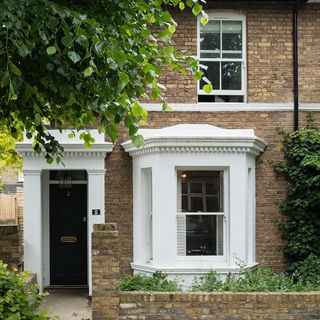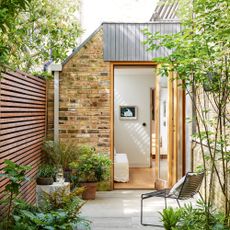Brexit house prices – what do experts think will happen to the housing market in 2019?
Here's the verdict...

There are three things most Brits are obsessed with. The weather, tea (which as everyone knows, makes everything better), and house prices - or more specifically Brexit house prices. If you're anything like us, you probably use the Zoopla Home Valuation tool at least once a month, know the ceiling price for your street to the nearest penny, and are itching to know what's going to happen to house prices in 2019.
Related: The cheapest places to buy and rent in the UK – find them with this new price comparison tool
However, with Brexit on the horizon our obsession with house prices has hit a new high. A report by Nationwide yesterday revealed that overall house prices were up just 0.2 percent on last year. This is the tenth month in a row that annual house prices have grown by less than 1 per cent.
Rather than panicking and speculating over whether house prices will crash if we leave the European Union on the 31st October. We asked some experts for their take on the housing market. Will Brexit send house prices tumbling, or will we continue to see values rise?
Brexit house prices according to the experts
The professional services firm view

Professional services firm KPMG has a largely positive prediction for the UK's housing market and Brexit house prices, should we leave with a deal on October 31st. It forecasts, that should this scenario play out house prices should stabilise in 2019, climbing by 1.3 per cent in 2020.
However, in the event of leaving without a deal, things may not be a quite as rosy. As Yael Selfin, Chief Economist at KPMG UK, explains:
'The housing market has been stuck in the slow lane since 2016 – with the changes to stamp duty and the uncertainties of Brexit putting the market on the back foot.
Get the Ideal Home Newsletter
Sign up to our newsletter for style and decor inspiration, house makeovers, project advice and more.
'As our forecasts show, a no-deal Brexit will see house prices decline significantly across the UK in 2020 by an average of 6.2 per cent, with more severe falls of around 10-20 per cent also possible if we look at historic precedents.'
The solicitor's view

When it comes to whether to consider buying a home amid continued Brexit uncertainty, David Pett, Director and Solicitor at MJP Conveyancing recommends that first-time buyers should snap up a home now rather than waiting. However, he cautions this would need to be with an awareness that there could be a potential recession/job losses in the event of a no-deal Brexit. Speaking to the Homeowner's Alliance, he said:
'For first time buyers, subject to what I say about possible job losses, this is the time to strike. Interest rates remain low, and may be reduced even further, and with low increases in price, it should be cheaper to get on to the property market.” So first time buyers will need to make sure they stress-test their monthly payments before committing to mortgage borrowing.'
And in additional advice for sellers, he continues: 'If I was purchasing a high value property I would consider waiting for the budget to see what cuts if any are made to thresholds of stamp duty.'
The bank's view

'Looking ahead, aside from the obvious political and economic uncertainty, the biggest issue for the housing market in 2019 will be the degree to which mortgage payment affordability changes,' says Russell Galley, managing director at Halifax. 'Average pay growth is likely to gather pace but, with a further interest-rate increase also predicted, house prices are unlikely to be pushed significantly in either direction.'
On the basis that the UK exits the EU with a form of withdrawal agreement and transition period, however, Russell remains cautiously optimistic about Brexit house prices. 'We expect annual house price growth nationally to be in the range of 2 per cent to 4 per cent by the end of 2019. This is slightly stronger than 2018, but still fairly subdued by modern comparison. However, the uncertainty around how Brexit plays out means there are risks to both sides of our forecast.'
'Longer term, the most important issue for the housing market remains addressing the affordability challenge for younger generations through more dynamic housebuilding.'
The mortgage broker's view

'Brexit is already a significant influence in the housing market, particularly in London,' says Ray Boulger, Senior Mortgage Technical Manager at John Charcol. 'So the key questions are "how much is already reflected in prices" and "whether Brexit is better or worse than expected".'
'Also, housing is far from a perfect market as changes in demand can happen quite quickly but changes in supply take longer, especially when looking at overall supply, i.e. the number of new homes built. The state of the economy, particularly employment, consumer confidence, the availability of mortgages and interest rates will also influence things,' Ray continues. 'Many of these are interlinked and so, despite what Mark Carney has threatened, if the economy weakens too much after Brexit I expect Bank Rate to be cut rather than increased.'
'Longer term interest rates fell sharply in the last quarter of 2018 and these falls are not yet fully reflected in lower fixed-rate mortgages. Other global factors have had a bigger influence on recent interest rate movements than Brexit and this highlights why it would be a mistake to be too insular when considering the 2019 housing market. I expect to many lenders to cut rates on their fixed rate mortgages in January, which will help improve the sentiment of potential buyers as monthly costs fall.'
'Avoiding a no deal Brexit is clearly in the interests of both the UK and the EU. Therefore Parliament’s approval of what I think is the most likely scenario, an agreement broadly in line with Teresa’s May’s current proposal, with certainty introduced over the maximum timeframe for any backstop, would remove the short term uncertainty and hence be seen as mildly positive. On the other hand, a no deal Brexit would be a short-term negative factor for house prices.
'Either way, much of the impact on prices is already in the market but activity levels will suffer until the outlook becomes clearer and so the number of housing transactions in 2019 will at best be similar to 2018, but probably a little lower, which means transaction levels will have been broadly unchanged for six years.'
'Whatever sort of Brexit we get...will be reflected in the housing market, as elsewhere, but I expect little change in house prices in 2019, with an overall small increase of 1 per cent. As always there will be regional variations, with London showing a small fall and parts of the Midlands and North showing the biggest gains.'
'Towns in Northern Ireland close to the border with Ireland could present some interesting Brexit opportunities. Although Northern Ireland is seen generally as being the part of the UK most affected by Brexit, traders in border towns like Newry have benefitted hugely from the fall in the pound since the referendum, with some reporting that 75 per cent of their trade comes south of the border visitors. Brexit may present even more opportunities for cross border activity!'
The estate agent's view

While Right move only reports asking prices not sold prices it says demand for property has begun to increase over August. 'Many have got used to living in the jaws of uncertainty since the referendum over three years ago, and been getting on with their lives and housing moves,' says Miles Shipside, Rightmove director and housing market analyst. 'However, as we approach yet another Brexit deadline, there are signs that the increasing gnashing of teeth is causing some to hesitate.'
'The autumn bounce normally kicks off at the same time as kids go back to school, but this year it's a late starter at best, and if uncertainty persists then the autumn term could be missed altogether and its activities be delayed until the new year,' adds Miles. 'Those who are planning to buy or trade up and can keep their nerve whilst others hesitate may find that they are in a stronger negotiating position to get a favourable deal.'
Commenting on research into house prices in 2018, Richard Donnell, Insight Director at Zoopla, had this to say. 'While overall values have grown by 1 per cent, this is slower than the 3.5 per cent growth in 2017. The slower growth is down to the value of housing falling in London and the East of England, while values have increased across the rest of the country. Scotland and Wales are where values have grown more than the national average.
'These changes in value have much to do with the evolving housing cycle and housing affordability,' Richard adds. 'Values in London have grown significantly since 2010 but multiple tax changes and affordability pressures are resulting in values falling back.'
More housing news: This is currently how long it takes to sell a property in the UK
So there you have it – things aren't looking so good if you own in London or the south east. But it's potentially better news for people wanting to get on the housing ladder in the capital, and for homeowners in other parts of the country. However, until Brexit plays out, it's hard to be certain of anything.

Amy Cutmore is an experienced interiors editor and writer, who has worked on titles including Ideal Home, Homes & Gardens, LivingEtc, Real Homes, GardeningEtc, Top Ten Reviews and Country Life. And she's a winner of the PPA's Digital Content Leader of the Year. A homes journalist for two decades, she has a strong background in technology and appliances, and has a small portfolio of rental properties, so can offer advice to renters and rentees, alike.
-
 This editor-favourite rug brand is having a rare sitewide sale! These are the ones we already have and love
This editor-favourite rug brand is having a rare sitewide sale! These are the ones we already have and loveRuggable offering up to 20% off sitewide and you don't want to miss it
By Rebecca Knight
-
 How to soundproof a garden - 7 ways to block out the noise
How to soundproof a garden - 7 ways to block out the noiseStuck with noisy neighbours? Busy road ruining your garden tranquillity? Here’s some effective ways to shut out the sounds
By Richard Jones
-
 The best kitchen island layout ideas for a sociable and practical cooking space
The best kitchen island layout ideas for a sociable and practical cooking spaceKitchen designers reveal the ideal kitchen layout ideas to make the most of every inch of space
By Holly Cockburn